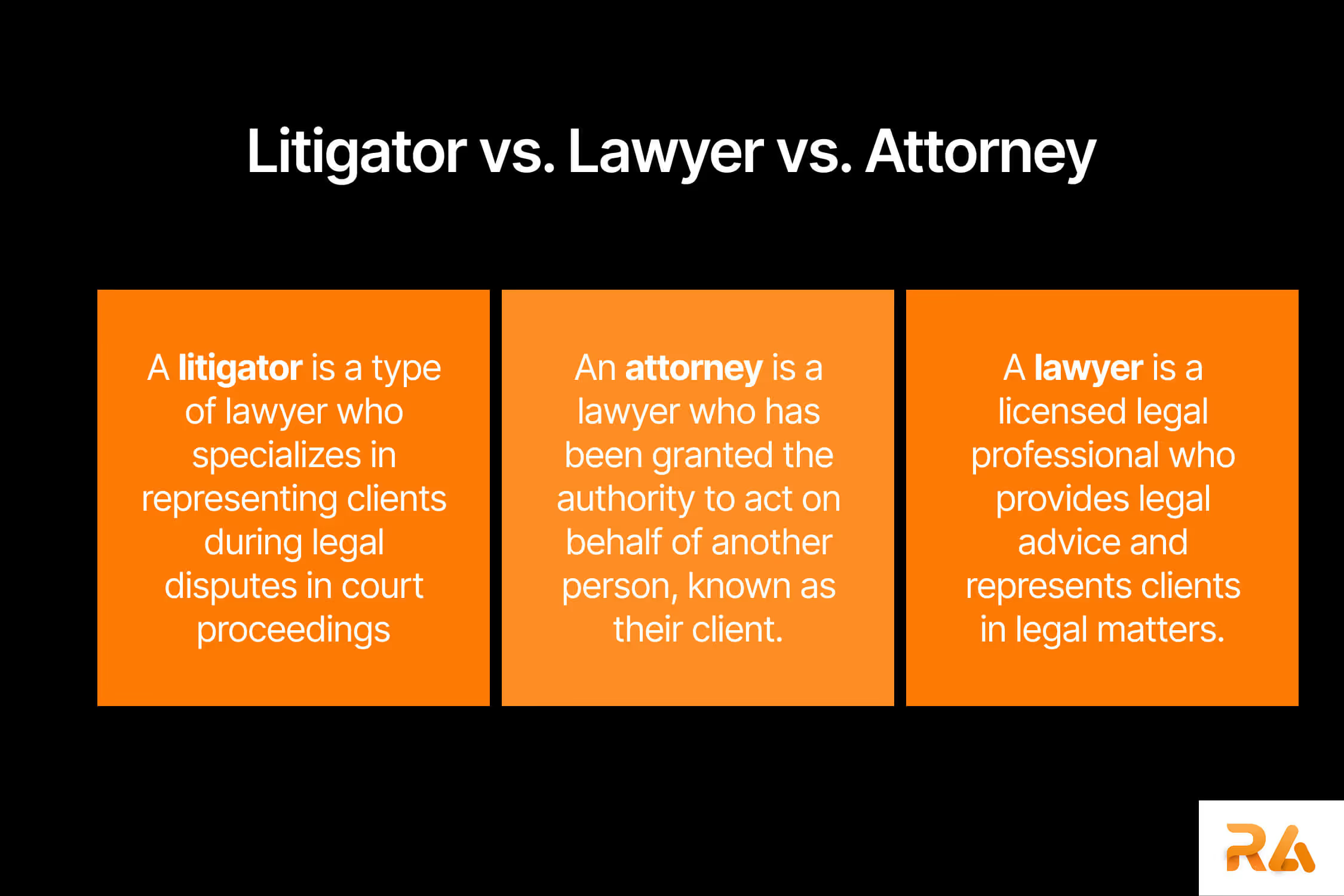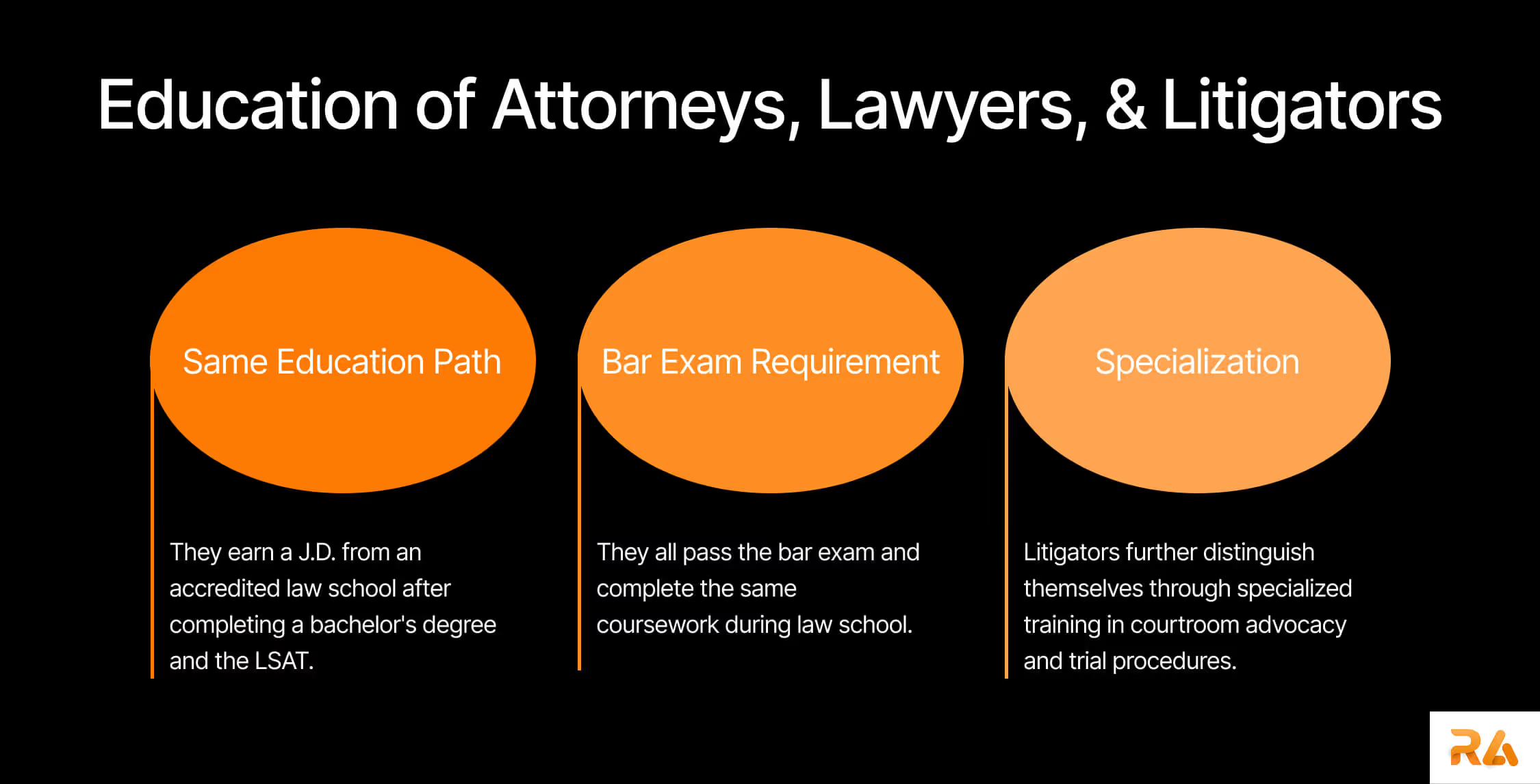When you're facing legal issues, knowing who to turn to can be confusing. You've probably heard the terms attorney, lawyer, and litigator used interchangeably, but are they really the same? While all three have legal education, each has a distinct role and set of responsibilities.
In this article, we’ll break down the key distinctions between attorneys, litigators, and lawyers. We’ll explore their roles, education, responsibilities, and help you determine which professional is the right fit for your legal needs.
Litigator vs. Lawyer
A litigator is a lawyer who specializes specifically in court cases and lawsuit representation.
A lawyer is a broad term that includes litigators and others who handle various types of legal work.
A litigator represents clients in court proceedings, while a lawyer may focus on non-courtroom work like contracts or legal advice.
Litigator vs. Attorney
A litigator is a specialized attorney who focuses exclusively on courtroom advocacy and managing lawsuits.
An attorney is a general term for any licensed legal professional, including lawyers and litigators, who can practice in court and may also work in non-litigation roles.
All litigators are attorneys, but not all attorneys are litigators, because some focus on paperwork or transactional matters rather than court cases.
Lawyer vs. Attorney
A lawyer provides legal advice and representation for clients.
An attorney is a lawyer who is actively authorized to represent and act on behalf of clients.
Lawyers don’t necessarily go to court, but attorneys are expected to practice in court.
Lawyer vs. Attorney vs. Litigator: Comparing Definitions

To better understand the difference between the three, let's examine their definitions from trusted legal sources.
What is a Lawyer?
The word "lawyer" derives from the Old French term lawier, referring to someone who is educated and trained in law practice.
A lawyer is a licensed legal professional who provides legal advice and represents clients in legal matters. They are educated and can specialize in different areas of the law, such as family law, criminal law, or business law. Lawyers represent individuals, businesses, or government entities, working to uphold the law and safeguard people's rights.
Merriam-Webster defines a lawyer as someone “who conducts lawsuits for clients or to advise as to legal rights and obligations in other matters.”
What is an Attorney?
The term "attorney" according to Oxford English Dictionary (OED) originates from the Old French word atorné, meaning "appointed" or "assigned." This reflects the role of an attorney as someone who is educated, trained, and appointed to represent on behalf of another person in court.
An attorney is a lawyer who has been granted the authority to act on behalf of another person, known as their client. The term emphasizes the representative relationship and the formal appointment aspect of the legal profession.
Merriam-Webster defines an attorney as someone “who is legally appointed to transact business on another's behalf.”
What is a Litigator?
The earliest known use of the noun 'litigator' is in the mid 1600s. It comes from the Latin word litigatus, meaning “to dispute” or “to quarrel.”
A litigator is a type of lawyer who specializes in representing clients during legal disputes in court proceedings. Their role is to handle cases that involve initiating or defending legal action on behalf of their clients through the judicial system. Litigators are trained in courtroom procedures, rules of evidence, and trial advocacy.
While all litigators are lawyers, not all lawyers are litigators. Litigation is a specific area of legal practice that demands strong analytical, strategic, and public speaking skills. Litigators often work in high-pressure environments to protect their clients by navigating legal procedures and presenting persuasive arguments before judges and juries.
Difference in Roles and Duties
The difference between these roles lies in their practice authority, specialization, and relationship with clients.
Lawyer Duties
A lawyer has completed legal education and training but may not necessarily practice law in the traditional sense. Their primary duties might include:
- Provide legal advice
- Research legal precedents and analyze legislation
- Draft legal documents
- Teach law or work in academia
- Serve as legal counsel
Lawyers possess the legal knowledge and expertise to understand legal matters, but they may choose career paths that don't involve representing clients in courtroom settings.
Attorney Duties
An attorney, having passed the bar exam and been admitted to practice, can perform all the duties of a lawyer plus:
- Represent clients in court
- File motions and argue cases
- Negotiate settlements on behalf of clients
- Establish attorney-client relationships
- Act on a client’s behalf under power of attorney
Attorneys have a fiduciary duty to their clients, meaning they're legally obligated to act in their clients' best interests.
Litigator Duties
A litigator is a specialized attorney who focuses exclusively on dispute resolution through the court system. Their responsibilities include:
- Manage entire litigation process
- Conduct discovery procedures
- Prepare and argue pre-trial motions
- Develop trial strategies and prepare witnesses
- Cross-examine opposing witnesses and experts
Litigators are courtroom specialists who dedicate their practice to trial law and courtroom advocacy.
Difference in Education

The educational path for lawyers, attorneys, and litigators is essentially identical through law school, with differences appearing in post-graduation specialization. They all go through the same foundational educational journey and complete the same educational requirements.
All three roles must earn a bachelor's degree, complete a Juris Doctor (J.D.) program at an accredited law school, and pass the bar exam to practice law. Litigators further distinguish themselves through specialized training in courtroom advocacy and trial procedures.
Which Legal Professional Do You Need?
No title is better than the other, selecting the right legal professional depends on your specific situation and the nature of your legal needs. If your case involves court proceedings, complex litigation, or trial work, a litigator may be the best choice. For legal matters that don’t involve going to court, an attorney or lawyer can provide the guidance you need.
In summary, while the terms lawyer, attorney, and litigator are often used interchangeably, they each play different roles within the legal field. Lawyers offer legal advice or work in various legal settings, attorneys are authorized to represent clients, and litigators specialize in resolving disputes through the court system.
Knowing the difference can help you make informed decisions when seeking legal assistance. When dealing with any legal issue, consulting with a legal professional is the safest approach to ensure you receive the right guidance throughout the entire legal process.

FAQ
Do all lawyers go to court?
No, not all lawyers go to court. Many work in areas where court appearances aren’t necessary, focusing on tasks like drafting contracts, providing legal advice, handling business transactions, or conducting legal research. Only lawyers who are litigators or trial lawyers regularly appear in court.
What is the meaning of litigator?
A litigator is a type of lawyer who specializes in the litigation, handling lawsuits and disputes by representing clients in court proceedings. Their main role is to take or defend legal action on behalf of individuals, groups, or organizations in civil or sometimes criminal cases.



.webp)
.webp)